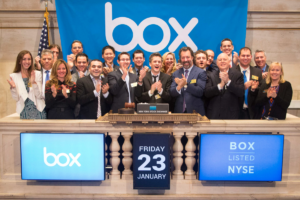Shares of Box, trading on the NYSE under the ticker symbol BOX, lost nearly a fourth of their value on Thursday after the cloud content management and file sharing service company offered up weak revenue guidance for the coming year. The market has been keeping a close eye on the thirteen-year-old tech firm in the recent period, especially after last month, when its San Francisco-based rival Dropbox filed to list on the Nasdaq.
Given the Redwood City, Calif.-based software provider beat the Street’s earnings expectations in the most recent quarter, the sell-off indicates that investors are viewing future prospects for the SaaS provider with a much more bearish lens. As a result, its changing multiple could weigh on the IPO valuation of other enterprise software providers, including that of Dropbox, set to hit the public market trading under the ticker symbol DBX.
It’s important to note, however, that Box’s status as a SaaS benchmark is less strong as the company matures and its growth rate decelerates compared to enterprise software industry startups of smaller scale.
In the most recent quarter, analysts had expected Box to post guidance for a $0.08 loss on an adjusted per share basis in the current quarter on revenue of $144.27 million. The company fell short of the consensus estimate for guidance, with management forecasting revenue between $139 to $140 million, or $142 to $143 million without a change in accounting standards.
According to a report from Crunchbase, after the sell-off, Box, with a market cap around $2.63 billion saw a “dramatic incline” in both its annualized run rate revenue (ARR) multiple and trailing revenue multiple, at 4.8 times and 5.2 million respectively.
As future cash flows shrink, investors are clearly finding that their growth story for the company may have been too optimistic. Despite pessimism, however, CEO Aaron Levie indicated that more product offerings and better customers will drive revenue to $1 billion by 2020. He added that his company and and Dropbox are in “fundamentally different markets,” with the former targeting larger enterprises.
























